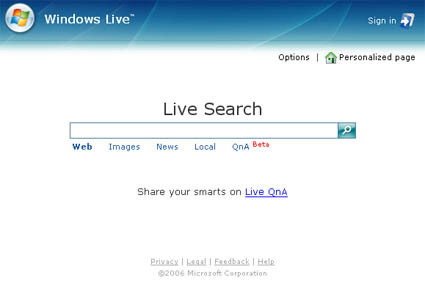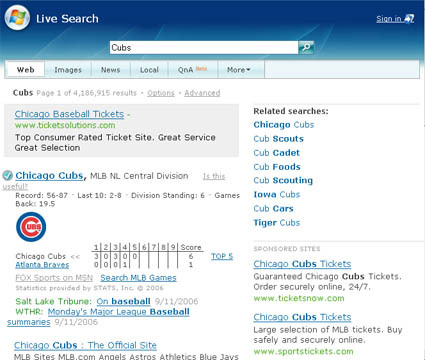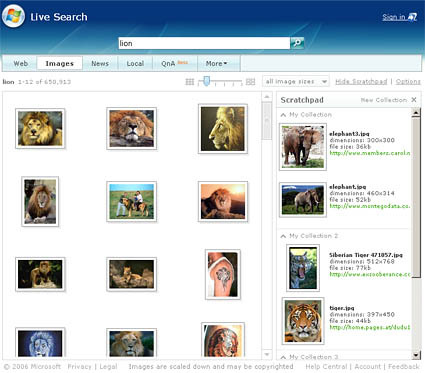Microsoft unleashes Live Search - a first look
Redmond (WA) - Microsoft released its Live Search engine late Monday in an effort to catch up with market leaders Google and Yahoo. It is Microsoft's most aggressive move against Google yet and shows promising, unique features. But Live.com may not reveal its true potential just yet: Search could become the core tool for a next generation of applications and services.
The launch of Live Search came a bit unexpected on Monday evening - and in fact may have been accelerated by a few hours to steal thunder from product news that are predicted to emerge from Apple's "Showtime" event and a Dell press conference scheduled for Tuesday morning. And the announcement may be significant enough to do just that. While Microsoft basically has re-launched a search engine as part of its Windows Live network, the importance of the technology is reaching further: The company has the first and major cornerstone for future applications and services now in place.
"The launch of Live Search is a significant milestone for our services business, with our core search and monetization platform ready for prime time for MSN and Windows Live as well as for partners through syndication deals," said Christopher Payne, Microsoft's corporate vice president of Live Search, in a prepared statement. "We now have the base to weave search through our services in ways that bring value to customers. This is just the beginning. We look forward to continued investment in search to deliver services that bring new levels of control and personalization to the Web experience."
The Live Search interface
Payne was referring to "the first of several more to come this fall that will demonstrate Microsoft's commitment to building and delivering services that bring new levels of control and personalization to the Web experience." While Microsoft is reaching deeper into web services and is trying to keep up with Google, Live Search technology is also expected to make its way back into Microsoft's core applications on the desktop. Web, network and desktop search will become essential tools that will enable users to depart from a habit to organize information in folders and gain improved access to their files and data at the same time.
In a scenario that may be reminiscent of Microsoft's strategy to defeat the Netscape Navigator web browser, relational search may eventually penetrate most Microsoft applications and go down a path where Google cannot follow. It's not too hard to imagine that Live Search could become a part of Windows and Office just like the Internet Explorer did almost a decade ago.
Looking at current market share numbers, Payne and his team have quite some work to do in order to make an impact on overall user behavior. According to Nielsen Netratings, MSN Search, which will be using Live Search, was estimated to have been used for only 9.6% of all web searches in July of this year. Google held a comfortable 49.2% and Yahoo 23.8%. MSN Search experienced a steady decline in market share over the past months - a development Live Search not only aims to slow down, but to revert. To convince users to switch back will depend mainly, but not exclusively, on characteristics such as ergonomics, usability and features. So, what exactly does Live Search offer over Google?
Get Tom's Hardware's best news and in-depth reviews, straight to your inbox.
Microsoft's announcement highlights Live.com as "personal search home page" on which users can "harness the power of Live Search to find, customize and track news, images, video, RSS feeds and blogs across the Web." There's also "Live Local Search [that] will offer increased availability of bird's-eye imagery, improved mobile integration and functionality, and other user interface improvements and customization tools," Microsoft said. In what could be considered a very rare event in public relations, especially for Microsoft, the press release may actually be an understatement, as a closer look at the new search engine reveals that Live Search may be much more than that.
Besides pure functionality, Microsoft has worked on the integration of search elements and has improved the design of the user interface. Compared to Google, the search homepage shows the same simple layout, but results are presented in a more complex way that actually could assist more users to find what they are looking for. For example, a search for "Cubs" results in a search result that is focused on the baseball team of the "Chicago Cubs" with latest game standings and a link to the homepage of the team. But Live Search also provides related links that are useful, if you're not looking for the Chicago Cubs - but for Cub Scouts, Cub Foods or Tiger Cubs. That feature has been offered by other search engines, including ask.com, for some time. The design and integration are certainly a matter of personal taste, but Microsoft has found a way to make search a bit easier and quicker. Google for comparison, lists the first non-Chicago Cubs search result in this very specific case on the third page and rank #38.
Improved relational search results
No surprise, there are still basic search disciplines in which Google may be the better choice. Most notably, Live Search lacks a simple "What is...?" definition search. While Google often returns simple answers to simple questions right away, Live Search returns links to websites. Of course, Microsoft has caught up with Google's strategy to sell content related advertising: The first search result is always a related ad and there are Google-style text ads on the right edge of the search screen.
News, Local search and Questions and Answers ("QnA") are part of the search engine as well, but appear to be a bit rough on the edges, especially compared to similar services provided by Google and Yahoo. Microsoft, however, delivers a new idea for its image search: Image search results are presented with image details, scalable thumbnails and a directly integrated "scratchpad" that enables users to research and collect multiple images at the same time. So far, the scratchpad is limited to the image search.
Microsoft's Image Live Search. The "scratchpad" (right) acts as organization tool for images
Live Search is without doubt Microsoft's most compelling search tool so far. The functionality and ease of use of the core search as well as the image search is dramatically improved over the previous MSN Search. Overall, Live Search may still be a mixed bag today, but it's good enough grow into a more serious challenge for Google and Yahoo. At this time, it is pure speculation whether Live Search has the potential to become an actual threat for Google or not. But Microsoft has made its first move and the impact of the strategy may become more visible with the introduction of more Live services as well as new software such as Windows Vista and the new Office package.
Related article:
Microsoft introduces a search tool for all its search tools
Tom's Hardware is the leading destination for hardcore computer enthusiasts. We cover everything from processors to 3D printers, single-board computers, SSDs and high-end gaming rigs, empowering readers to make the most of the tech they love, keep up on the latest developments and buy the right gear. Our staff has more than 100 years of combined experience covering news, solving tech problems and reviewing components and systems.



